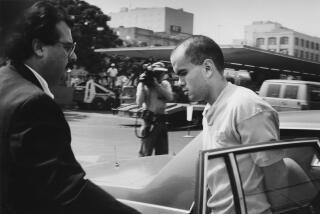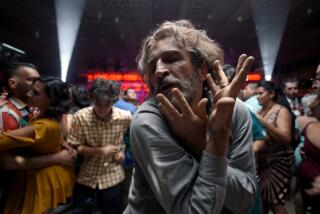Fan Convicted of Murder in Actress’ Slaying : Trial: Judge also rules that the obsessed Robert Bardo lay in wait for Rebecca Schaeffer, requiring a sentence of life in prison without the possibility of parole.
- Share via
A Superior Court judge on Tuesday found an obsessed fan guilty of first-degree murder for shooting actress Rebecca Schaeffer in the doorway of her Fairfax district apartment building two years ago.
Superior Court Judge Dino Fulgoni, who heard the case without a jury, also found Robert John Bardo guilty of the special circumstance of lying in wait to kill the actress, requiring a sentence of life in prison without the possibility of parole.
The judge gave little weight to testimony by a defense psychiatrist, who said Bardo is a schizophrenic whose illness led him to shoot Schaeffer on July 18, 1989, when she answered her door.
Bardo, then 19 and a resident of Tucson, Ariz., had been obsessed with the co-star of the television situation comedy “My Sister Sam” for two years, sending her letters and trying to visit her.
He finally obtained her address through a private detective, who got the information from the California Department of Motor Vehicles. Since Schaeffer’s death, access to DMV records has been restricted.
In comments before he announced the verdict, Fulgoni said evidence showed that Bardo planned the killing and may have even consciously ambushed Schaeffer after she answered her doorbell.
Bardo, wearing a white shirt with rolled-up sleeves, sat rocking in his chair at the defense table while the judge announced his decision. The defendant has been jailed since the day after the killing and is scheduled to be sentenced Nov. 27. The death sentence was ruled out in the case after Bardo agreed to waive his right to a jury trial.
As the 21-year-old high school dropout was led from the courtroom, Schaeffer’s boyfriend, Bradley Silberling, walked up to him and called him a coward.
Then Schaeffer’s mother, Danna Schaeffer, who had sat with her husband, parents and friends in the courtroom every day of the month-long trial, leaned forward and said:
“You will have to live with your guilt for the rest of your life.”
Outside the courtroom, her husband, Benson Schaeffer, told reporters the verdict was appropriate.
“What else can we say?” he added. “I feel that Rebecca will not come back to us as a result of the verdict, but justice was done.”
The Schaeffers live in Portland, Ore.
In his closing argument to Fulgoni, Bardo’s lawyer, Deputy Public Defender Stephen Galindo, did not deny that Bardo intended to kill the 21-year-old actress, but argued that he should be found guilty of nothing more than second-degree murder.
“Rebecca Schaeffer is a victim in the true sense of the word and did nothing to deserve what happened to her,” Galindo said. But, he added: “Robert Bardo, too, is a victim.”
He portrayed him as a mentally ill person who was neglected by his parents, the mental health system and the courts. His client, he said, was not given an expert psychiatric evaluation until two months before the case went to trial.
Galindo denied that Bardo had lain in wait for Schaeffer, contending that the young man had been so awed by a brief encounter with the actress an hour before the slaying that he returned to her apartment to give her a letter.
Bardo impulsively shot Schaeffer when the actress seemed irritated by his second visit, Galindo said.
During her closing argument Tuesday, Deputy Dist. Atty. Marcia Clark said Bardo was motivated to kill Schaeffer by his obsession with gaining fame.
In conceding that his behavior was not normal, Clark acknowledged that “a normal person does not stalk and murder someone he doesn’t even know.”
But, she told Fulgoni, “this was less than extreme psychosis” and thus merits a first-degree murder conviction.
She also attacked the credibility of Dr. Park Elliott Dietz, a psychiatrist who studies killers of celebrities. Testifying for the defense, he said Bardo had been mentally ill since childhood and had been raised, along with a mentally ill brother and other siblings, by a mentally ill mother.
Clark accused Dietz of passively accepting Bardo’s version of the killing without challenging its veracity.
In a videotaped jailhouse interview with Dietz two days before the trial began last month, Bardo admitted shooting Schaeffer. On the tape, he acted out the sounds of the gunshot and of the dying actress screaming “Why, Why?”
More to Read
The complete guide to home viewing
Get Screen Gab for everything about the TV shows and streaming movies everyone’s talking about.
You may occasionally receive promotional content from the Los Angeles Times.






